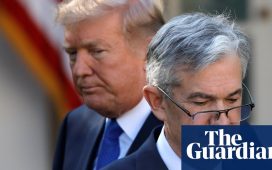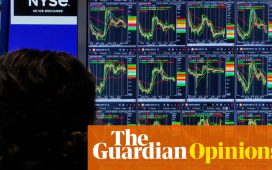Unlock the US Election Countdown newsletter for free
The stories that matter on money and politics in the race for the White House
I have a nightmare. The next US president declares that his country no longer stands by its commitment, under the Nato treaty, to come to the defence of a member. The Europeans fail to put together a credible replacement. Fearful of the threat from a revanchist Russia, a number switch their allegiance to Russia and China. Europe dissolves. Is this plausible? I hope not. Yet behind the nightmare is reality. We are entering a period of resurgent nationalism, xenophobia and authoritarianism.
As Oscar Wilde might have remarked, “To elect Donald Trump as president once may be regarded as a misfortune; to elect him twice looks like carelessness.” His return would indicate something very disturbing about the state of the west’s superpower.
The Brookings Institution’s Robert Kagan notes in a podcast with me that Trump’s proximity to power is due to potent anti-liberal forces. The implications of such attitudes for US democracy are worrying. But that worry is not limited to the domestic. Trump’s “America First” was a slogan used by the aviator Charles Lindbergh in opposition to US support for Britain in the second world war. This opposition only ended after Japan’s attack on Pearl Harbor in December 1941 forced the US into war.
Lindbergh was an isolationist. To the extent that he can be defined, Trump is an unreliable unilateralist. But, in the context of Russia’s ongoing war on Ukraine, this may not be a crucial difference. Would he help or would he see it as “a quarrel in a faraway country, between people of whom we know nothing”, in the notorious words of Neville Chamberlain on Czechoslovakia in 1938?
For over a century European security has depended on the US presence. After the first world war, alas, the Senate repudiated the League of Nations and so the US withdrew. That led to the re-emergence of Germany as the dominant military power in the continent and so to the second world war. Happily, the US remained engaged in the postwar era. After the collapse of the Soviet Union in 1991, it might have credibly believed that it should withdraw once again. But now, after Russia’s unprovoked invasion of Ukraine, that cannot be the case. China, also increasingly seen by the US as a threat, is providing strong moral and practical support to Russia, including dual-use goods valuable to the prosecution of its war. Again, that justifies engagement. What would Trump do? That might soon be a relevant question.
The collapse of the US-led security order in Europe would have global repercussions. The defeat of Ukraine would surely encourage China vis-à-vis Taiwan. But, beyond that, doubts about security guarantees in Europe would have implications for their credibility for Japan, South Korea, Australia or New Zealand. All over Asia, countries would try to get closer to China.
Alas, the EU, too, is threatened by nationalists, xenophobes and authoritarians within. Parties with these attitudes are expected to expand their presence substantially in the European parliamentary elections. In time, more of them are expected to achieve power: Marine Le Pen might even be the next president of France. When one thinks of the difficulties created just by the Putinism of Viktor Orbán, prospects are grim.
Nationalism is also reflected in the turning away from liberal trade that has been gathering force across the world. Trump played a leading role in legitimising protectionism in his period of office. Biden has followed suit. The present suspicion of trade has many causes: rising competition from China in manufacturing; post-Covid supply-chain disruptions; strategic competition; growing belief in industrial policy; and repudiation of the very notion of multilateralism, notably including the World Trade Organization. The Biden administration has developed a relatively sophisticated agenda around the ideas of “de-risking” trade. But action is getting more brutal. Thus, the US has imposed 100 per cent tariffs on imports of electric vehicles from China, for a mixture of security and industrial policy motivations. In response, Trump said that “they’ve also got to do it on other vehicles and they have to do it on a lot of other products because China’s eating our lunch right now.” It is highly probable that, in power, he would take aggressive action against imports not just from China, but from its allies.
The turnaround on trade is already profound. Throughout the postwar period, the US, influenced by both memories of the 1930s and postwar strategic objectives, promoted multilateralism and liberal market economies. There is now an increasingly bipartisan agreement that this was a grave mistake. While the Biden administration wishes to remain relatively close to its allies, its agenda, too, is somewhat “America First”. But Trump is far more unabashedly nationalist than Biden.
Putin is an unambiguous enemy of a peaceful European order. China’s decision to back him has, for me, been a watershed moment. But the more the western world wishes to defend itself in competition with China, the more it will also need to stick together. The nationalism of a Trump or of his imitators in Europe would make such co-operation nigh on impossible.
Even in our era of strategic competition, co-operation with China remains essential, notably over climate. The west must also respond more generously to the concerns of developing and emerging countries. But, first and foremost, it must survive as a community of liberal democracies. This is both a moral and a practical necessity. If authoritarian nationalism destroys that, the west will have lost the fight.
In 1939, the poet WH Auden wrote of what he judged “a low dishonest decade”. How will ours look in 2029?













